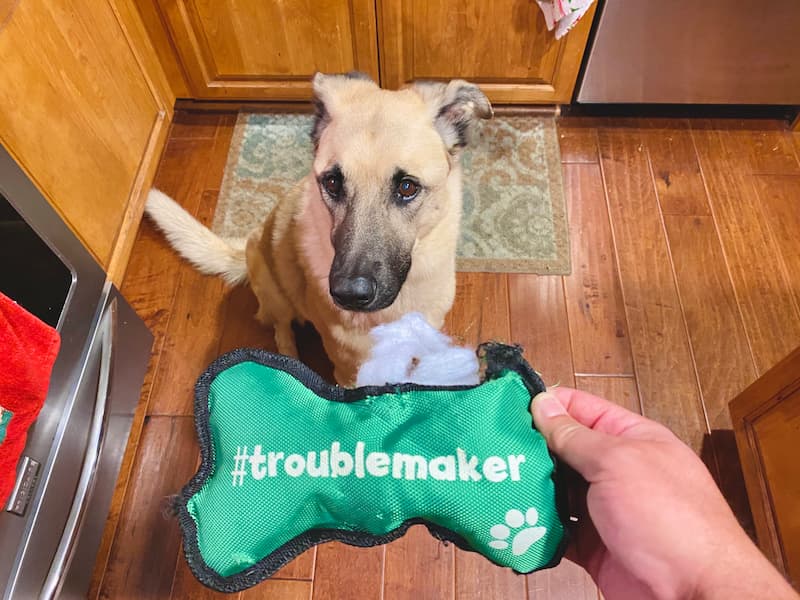Does your dog have a habit of chewing on its foot?
Are you worried that there’s something wrong with it?
Read on to have your biting questions answered.
Common Causes of Foot Chewing in Dogs
Dogs are known to have some peculiar habits, but one that can be particularly perplexing is their tendency to chew on their own feet.
If you’ve ever caught your furry friend indulging in this puzzling behavior, you might be wondering what could possibly be the reason behind it.
Well, fear not, for we are here to uncover the root of the problem!
Here are some of the common causes of foot chewing in dogs:
Allergies
Just like humans, dogs can suffer from allergies too.
Allergic reactions can lead to itchiness, and what better way to relieve that itchiness than through an impromptu foot chewing session?
Environmental factors or certain food ingredients can trigger these allergies in our furry friends, so it’s important to try and identify the culprit.
Keep an eye out for symptoms such as redness, swelling, or excessive licking in addition to foot chewing.
Boredom and Anxiety
Dogs are social creatures and need mental and physical stimulation to stay happy and healthy.
When they’re feeling bored or anxious, they often resort to finding ways to entertain themselves, and that might include gnawing on their own feet.
It’s their way of relieving stress and occupying their minds.
If a dog is feeling stressed or understimulated, they may turn to chewing on their feet as a form of self-soothing or as a way to release pent-up energy.
Providing mental and physical stimulation through interactive toys, training exercises, and regular exercise can help redirect their chewing behavior and keep them engaged.
Skin Issues and Infections
Dogs can suffer from various skin conditions that can cause discomfort and irritation, such as dermatitis or fungal infections.
These issues can lead to intense itching, which can make your furry pal resort to chewing on their paws.
It’s important to regularly check your dog’s feet for any signs of redness, sores, or foul odor.
If you notice anything out of the ordinary, it’s best to consult your veterinarian to diagnose and treat any underlying skin problems.
Parasites
Another potential reason for incessant chewing on their feet could be parasites.
Fleas and ticks are notorious culprits that can cause severe itching and discomfort.
These tiny parasites can be difficult to spot, but their impact on your dog’s well-being can be significant.
Regularly inspect your dog for fleas or ticks, especially if they spend time outdoors or interact with other animals.
If you spot any, promptly consult your veterinarian for appropriate treatments.
In addition to external parasites, internal ones like mites or worms can also cause itching and lead to excessive chewing.
Regular deworming and preventive measures against external parasites are crucial for your dog’s overall health and itch-free paws.
Remember, it’s crucial to understand the underlying cause behind your dog’s foot-chewing habit in order to address and resolve the issue effectively.
If you’re concerned about your furry friend’s persistent foot chewing or if you suspect something may be wrong, don’t hesitate to reach out to your veterinarian for guidance.
By getting to the root of the problem, you can help your four-legged companion find relief and ensure their paws are once again itch-free!
If you’re unsure about the cause of your dog’s foot chewing or if the behavior persists despite your efforts, it’s always best to consult with a professional to ensure the health and happiness of your canine companion.
When and How to Consult a Veterinarian for Foot Chewing Issues
While the occasional nibble may not cause concern, frequent foot chewing can be indicative of underlying issues that require professional attention.
Signs that your dog’s foot chewing may require veterinary intervention:
- Excessive chewing or licking that persists for several days
- Redness, swelling, or inflammation around the paws
- Sores, blisters, or wounds on the feet
- Intense itching or discomfort leading to incessant scratching
If your dog exhibits any of these signs, it is vital to seek professional help to determine the underlying cause of their foot chewing.
A veterinarian will be able to rule out serious health conditions such as allergies, infections, or even pain.
Additionally, they can provide appropriate treatment options to alleviate your furry friend’s discomfort.
Consulting a veterinarian for foot chewing issues:
Step 1: Schedule a veterinary appointment: Reach out to your trusted veterinarian and schedule an appointment to have your dog examined.
Be prepared to provide details about your dog’s foot chewing behavior, any changes in diet or environment, and any other relevant information.
Step 2: Veterinary examination: During the appointment, the veterinarian will conduct a thorough examination of your dog’s paws.
They may perform diagnostic tests, such as skin scrapings or allergy tests, to determine the cause of the foot chewing.
It’s crucial to be honest and open with your vet to ensure an accurate diagnosis.
Step 3: Treatment and follow-up: Based on the examination and test results, the veterinarian will develop a treatment plan tailored to your dog’s specific needs.
This may include medications, topical treatments, dietary changes, or even behavioral modifications.
Follow the veterinarian’s instructions diligently and attend any follow-up appointments to monitor the progress of your dog’s recovery.
Remember, as pet owners, it’s our responsibility to prioritize our dog’s well-being.
If your furry friend is experiencing persistent foot chewing, don’t hesitate to consult a veterinarian.
They possess the expertise and resources to identify the underlying cause and guide you towards appropriate treatment to help your dog find relief.
FAQ
Q: Is it normal for dogs to chew on their feet?
A: It’s actually quite common for dogs to chew on their feet from time to time.
While occasional chewing might be harmless, excessive gnawing could indicate an underlying issue that needs attention.
Q: Are there any specific reasons why dogs engage in this chewing behavior?
A: Indeed, there are several reasons why dogs might feel compelled to munch on their paws.
One common cause is allergies.
Just like us humans, dogs can be allergic to things like pollen, dust mites, or certain foods.
When their feet become itchy or irritated due to an allergic reaction, they resort to chewing it as a way to find some relief.
Q: So, should I be worried if my dog is constantly chewing on their paws?
A: If you notice your pup excessively chewing, licking, or biting at their feet, it’s best to pay attention and consult your veterinarian.
Continuous chewing might indicate a more serious issue, such as skin infections, hot spots, or even injuries that need professional attention.
Q: Can anxiety or boredom be a cause for chewing on their feet?
A: Absolutely!
Just like humans, dogs can experience anxiety, stress, or boredom.
Chewing on their feet sometimes becomes a soothing habit to cope with these emotions.
If your four-legged friend seems anxious or exhibits signs of boredom, providing mental stimulation, physical exercise, and engaging toys may help redirect their chewing tendencies.
Q: How about the possibility of foreign objects or irritants getting stuck in their paws?
A: Good point!
Sometimes, dogs simply chew on their feet because they’re uncomfortable.
Often, this discomfort stems from foreign objects like grass awns, small pebbles, or burrs getting lodged between their toes.
You can assist by carefully inspecting their paws to ensure they aren’t bothered by any irritants.
Q: Can I do something at home to alleviate my dog’s foot-chewing behavior?
A: While it’s essential to identify the root cause through a veterinary examination, there are a few things you can try at home.
Regularly cleaning your dog’s paws, using pet-safe moisturizers when dryness is a concern, or even using gentle anti-itch sprays recommended by your vet might offer some relief.
Q: Are there any other tips to help prevent excessive paw-chewing?
A: Absolutely!
Maintaining good hygiene, such as keeping your dog’s paws clean and dry, can help prevent skin issues that lead to chewing.
Additionally, trimming their nails regularly is crucial to avoid any discomfort when walking or running.
And never forget, seeking professional guidance from your vet should always be your top priority.
Concluding Remarks
And that, my friends, are the peculiar reasons behind why dogs chew on our feet!
It’s clear that dogs have their reasons for engaging in this somewhat odd behavior, and it’s important for us to understand them.
Whether it’s due to their natural instinct to explore the world through their mouths, teething discomfort, anxiety, or even just an expression of affection, our furry companions have their own unique ways of communicating with us.
So, the next time you find your dog gnawing on your toes, don’t fret!
Take a step back and consider what might be causing this behavior.
Perhaps it’s time to provide them with more chew toys or invest in some puzzle games to keep their minds occupied.
Maybe it’s a sign that they need a little extra love and attention.
Regardless, understanding the motives behind their actions will undoubtedly strengthen the bond between you and your loyal four-legged friend.












